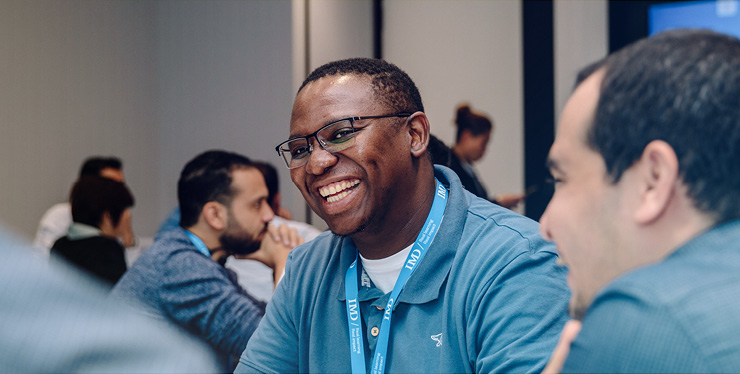
Never settle for second-best
“If you really want to go into this, 10x isn’t enough. You should be aiming for more. If you think too small, it’s just not worth the effort.” That’s what Chris Rangen, Strategy Advisor at IMD’s Venture Capital Asset Management program, shared with the group during the program’s weekend simulation.
The message was clear: mindset matters. To build a top-performing venture capital fund, you have to raise the bar, set bold expectations, and execute with precision. “It really stuck with me,” he says. “It was a strong motivation to never settle for second-best, to strive for excellence. If you want to be in this industry, your expectation should be to land in the top five or ten percent,” he says.
“The startups found me”
Quadbeck didn’t always plan on becoming a Business Angel. After earning his MBA, he worked as a consultant at McKinsey and later led large commercial teams at Google. He also founded two startups of his own, one of which exited successfully.
“Then, the startups found me,” he explains.
With his background in tech, sales, and strategy, early-stage founders began approaching him for support. He started investing his own capital and occasionally joined as Chief Sales or Revenue Officer to help commercialize the business. Over time, his portfolio grew to more than 25 startups.
But as his scope of investing matured, so did his view on how to grow further. Over time, he realized it was better to be part of a network of Business Angels, so he joined Innovexus, a community of active Business Angels with chapters across Europe. That network sparked his desire to further scale his impact.
“I wanted to level up as an investor – gaining deeper insights, a wider network, and a better understanding of how the industry really works.”
That’s when he found IMD’s Venture Capital Asset Management program.
Investing in people, not fact sheets
The four-day program offered two days of theory, followed by two days of practical application. For Quadbeck, the mix was exactly what he needed: a blend of frameworks, validation, and momentum to push his thinking forward.
One classroom exercise in particular helped crystallize a principle Quadbeck already held: that early-stage investing is ultimately about people. The group was asked to review a series of startup pitches – evaluating the models, the opportunities, and, most importantly, the founding teams. They then looked back at how each company had developed over the following five years, with the benefit of hindsight.
“That’s something you don’t always get to experience. Oftentimes, you lose sight of the startups that you decided not to invest in, unless they become a unicorn and are all over the press. But it was interesting to see how these stories developed over time and whether they made it, whether we got our evaluation right.”
The exercise also reinforced a key insight: in early-stage investing, the business model might shift, but the founding team is the constant.
“It reminded me that you can’t overthink the details in the fact sheet and business plan,” it’s much more important to invest in the right people and in the right team,” he says.
“By the end of the program, I had about three big pages with bullet points, bigger and smaller things I took away as action items or things I want to remember for the future,” he says. “Not to change my approach completely, but definitely in many smaller ways.”
Peers, mentors and future partners
Beyond frameworks and mindset, the program also opened doors to new connections. The opportunity to engage with leading practitioners and VC firms from across the landscape added both insight and inspiration.
“We had speakers who had raised significant funds, others running more boutique venture firms, and they brought very different perspectives,” he says. “It was top-notch and a very good mix. It was really interesting to listen to their stories and experiences and discuss with them their views on the venture capital industry.”
Quadbeck stayed in touch with several of the participants, as well as Jim Pulcrano – the Program Director – and the discussions are already leading to new collaborations.
Leading the next round
Today, Quadbeck is actively exploring the creation of a venture fund, one designed to close the funding gap that often emerges between early-stage traction and sustainable scale. A follow-up fund for the startups his Angel community Inovexus invests in.
“Especially in Europe, there’s money for seed and pre-seed – but there’s a lack of money in growth-stage startups” he explains. “That’s where I see opportunity: to step in, support them, and help them get through the entire lifecycle until an exit.”
With a sharper strategy, stronger network, and renewed sense of purpose, Quadbeck isn’t just backing the next generation of ventures. He’s helping to build them, every step of the way.


